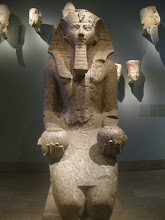I learned two things about two diplomatic missions today that upset me.
1. Diplomatic staff are not allowed to visit the occupied Palestinian territories as they wish.
I sort of knew this already, or I knew that there are special rules and that UN staff from abroad, for instance, are always based in Jerusalem and are restricted when it comes to traveling in the Palestinian territories.
I also knew that up until recently Canada's diplomatic staff, who are also always based in Jerusalem even though their office is in Ramallah, weren't allowed to drive in the occupied territories at all.
Today I learned that even though they are allowed to drive here now, they can't drive to other places than Ramallah, Bethlehem and Jericho.
How I found out? I suggested to a nice Canadian lady from the Canadian Representative Office that she go and watch Alice in Wonderland at the Freedom Theater in the refugee camp in Jenin. Really professional production, great actors.
And she went, "But I'm not allowed to go to Jenin if I don't go in an armored vehicle."
Did I miss something? Are we at war?
A little innocently I replied, "But you can go on a day off, no?"
"No, we're not allowed to."
But it's your DAY OFF. Why aren't you allowed to do whatever you want? Is what I wanted to say, but I didn't.
Oh, and for the record, it's obviously not the Palestinian Authority that forbids diplomats from traveling freely here; it's the diplomatic missions themselves who set up all these completely-disconnected-from-reality type of rules for their staff. Or rather, it's their governments who do.
As if Jenin is somehow more dangerous than Ramallah. And as if Ramallah is dangerous to begin with.
Anyway, then I learned something else from a colleague who recently had a meeting with USAID staff in Jerusalem:
2. Only foreign aid recipients from the West Bank and Gaza are required by the USAID to sign anti-terrorist provisions.
Never heard of the anti-terrorist provisions before?
It's a contract that all NGOs (well, Palestinian NGOs) have to sign every time they enter into a contract with the USAID.
But of course, we are allowed to work with Israelis if we want to.
We have signed the anti-terrorist provisions twice, and then, according to our contract, made all of the people we buy products or services from sign it too. Such as the printing company that does our roll-ups and banners, the store we once bought a camera from, our taxi drivers (but we actually don't make our taxi drivers sign a contract before we get into the car, because that would be ridiculous, and we told our donors just that), and the grocery stores we buy cookies and tea from (yes, there is a huge risk that the revenue they get from cookies goes directly to evil terrorist camp owners).
All the while, I naively thought everybody who receives foreign aid from the USAID had to sign these contracts.
But apparently, it's only Palestinians. Not Iraqis, Afghanis, Pakistanis, or anybody else who normally get labeled "terrorists" in the international media. Only Palestinians.
Does that make me feel good about the world?
Not really.
Does it surprise me?
Sadly enough, not really.
*These quotes are from an application to receive funding from the USAID, which is readily available to the public in Palestine in case anybody thought I'm disclosing top secret information here or something. The application form includes the special provisions that NGOs must be prepared to sign in order to get the funding.

1. Diplomatic staff are not allowed to visit the occupied Palestinian territories as they wish.
I sort of knew this already, or I knew that there are special rules and that UN staff from abroad, for instance, are always based in Jerusalem and are restricted when it comes to traveling in the Palestinian territories.
I also knew that up until recently Canada's diplomatic staff, who are also always based in Jerusalem even though their office is in Ramallah, weren't allowed to drive in the occupied territories at all.
Today I learned that even though they are allowed to drive here now, they can't drive to other places than Ramallah, Bethlehem and Jericho.
How I found out? I suggested to a nice Canadian lady from the Canadian Representative Office that she go and watch Alice in Wonderland at the Freedom Theater in the refugee camp in Jenin. Really professional production, great actors.
And she went, "But I'm not allowed to go to Jenin if I don't go in an armored vehicle."
Did I miss something? Are we at war?
A little innocently I replied, "But you can go on a day off, no?"
"No, we're not allowed to."
But it's your DAY OFF. Why aren't you allowed to do whatever you want? Is what I wanted to say, but I didn't.
Oh, and for the record, it's obviously not the Palestinian Authority that forbids diplomats from traveling freely here; it's the diplomatic missions themselves who set up all these completely-disconnected-from-reality type of rules for their staff. Or rather, it's their governments who do.
As if Jenin is somehow more dangerous than Ramallah. And as if Ramallah is dangerous to begin with.
Anyway, then I learned something else from a colleague who recently had a meeting with USAID staff in Jerusalem:
2. Only foreign aid recipients from the West Bank and Gaza are required by the USAID to sign anti-terrorist provisions.
Never heard of the anti-terrorist provisions before?
It's a contract that all NGOs (well, Palestinian NGOs) have to sign every time they enter into a contract with the USAID.
"The Recipient, to the best of its current knowledge, did not provide, within the previous ten years, and will take all reasonable steps to ensure that it does not and will not knowingly provide, material support or resources to any individual or entity that commits, attempts to commit, advocates, facilitates, or participates in terrorist acts, or has committed, attempted to commit, facilitated, or participated in terrorist acts."*And a terrorist act is
"an act of premeditated, politically motivated violence perpetrated against noncombatant targets by subnational groups or clandestine agents"*Or
"any other act intended to cause death or serious bodily injury to a civilian, or to any other person not taking an active part in hostilities in a situation of armed conflict, when the purpose of such act, by its nature or context, is to intimidate a population, or to compel a government or an international organization to do or to abstain from doing any act."*Which would mean that we aren't allowed to work with basically any Israeli, since they have all served in the Israeli army that frequently does just that. Performs acts that are intended to cause death to civilians not taking active part in hostilities, in order to intimidate a population, I mean.
But of course, we are allowed to work with Israelis if we want to.
We have signed the anti-terrorist provisions twice, and then, according to our contract, made all of the people we buy products or services from sign it too. Such as the printing company that does our roll-ups and banners, the store we once bought a camera from, our taxi drivers (but we actually don't make our taxi drivers sign a contract before we get into the car, because that would be ridiculous, and we told our donors just that), and the grocery stores we buy cookies and tea from (yes, there is a huge risk that the revenue they get from cookies goes directly to evil terrorist camp owners).
All the while, I naively thought everybody who receives foreign aid from the USAID had to sign these contracts.
But apparently, it's only Palestinians. Not Iraqis, Afghanis, Pakistanis, or anybody else who normally get labeled "terrorists" in the international media. Only Palestinians.
Does that make me feel good about the world?
Not really.
Does it surprise me?
Sadly enough, not really.
*These quotes are from an application to receive funding from the USAID, which is readily available to the public in Palestine in case anybody thought I'm disclosing top secret information here or something. The application form includes the special provisions that NGOs must be prepared to sign in order to get the funding.


















No comments:
Post a Comment